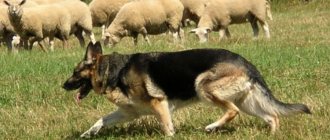Vaccination of German Shepherd puppies is necessary to ensure that they do not contract any infection. Until this time, it is not advisable to take your pet outside and meet other dogs.
Although owners always look forward to this moment, the first vaccination of a German Shepherd puppy should not occur before the baby is 2 months old. In order to develop strong immunity against diseases, you need to follow the rules and vaccination schedule.
General rules
Before vaccinating your German Shepherd puppy, you should become as familiar as possible with the rules and recommendations provided by your veterinarian.
The most important rule: vaccination is under no circumstances prescribed to a sick dog. Even general malaise is an important indicator that it is better to postpone the injection. Therefore, a few weeks before an important event, monitor your pet, take its temperature and pay attention to any changes in its behavior.
Since vaccination is not a therapeutic process, but the introduction of weakened viruses into the body to develop immunity, it can kill sick German Shepherd puppies. Or an unhealthy pet who receives an injection may become seriously ill or remain crippled.
When choosing a vaccination for your shepherd, be sure to consult a veterinarian. No reading forums or advice from experienced dog lovers. Such injections are no joke, so it is the doctor who will tell you how and when to vaccinate. It also happens that the injection scheme that suits an experienced shepherd owner may not work in your case. Therefore, everything here is decided in personal consultation with a veterinarian.
It is very important to follow the vaccination schedule, because if you vaccinate your dog ahead of schedule, the vaccine may not work.
The body after the vaccine
After vaccination, your pet may feel unwell - he will be lethargic, may refuse to eat, and his nose will be warm and dry. There is nothing strange about this - the body fights the virus and mobilizes all the forces it has to do so. This period usually lasts less than a day - if you observe a rise in temperature above 390C, you can use an anal suppository to reduce the fever.
The next day, your pupil should be back to normal - he eats, sleeps and behaves as actively as before. If this does not happen and the baby remains lethargic and depressed, contact your veterinarian; a complication may have occurred.
Among the alarming symptoms that indicate a complication may be the following:
- Dyspnea;
- Heavy secretion of saliva;
- Pallor of mucous membranes;
- Respiratory and cardiac arrest;
- Epileptic seizure.
The above signs indicate that the baby has an individual intolerance to the drug. Most often, doctors are able to save the dog - however, this is a reason to take care of a more careful selection of the drug for the next vaccinations.
Preparation and Precautions
The first vaccination is very important. And you need to be well prepared for such a procedure. First, adjust the puppy’s diet - it should be familiar to him, nothing new.
A week before such an important event, your German Shepherd puppy should be checked for helminths and given a special drug against these parasites. Next, you should monitor your pet. If he is cheerful, active, eats well, you can go for an injection. But it is better that the German Shepherd is vaccinated at home, since various infections can be picked up at the veterinary clinic.
Similar article: What is the difference between a German Shepherd and an Eastern European one and which is better?
If your “baby” is lethargic and does not want to eat, then they refuse vaccination for a while. In this case, the puppy should be shown to a doctor.
When to get vaccinated? It's best in the morning, on an empty stomach. Before this, the pet’s temperature is taken, and two days later he can be given antihistamines. On the day of the injection, you need to provide your pet with complete rest and plenty of fluids.
We recommend this article:
On what day after deworming should a dog be vaccinated?
First vaccination
The first vaccination should be given at the age of two weeks. Very often it is carried out by breeders if they have not yet purchased a puppy. In this case, the date of the injection and all documents for the vaccine must be in the dog’s veterinary passport.
If you will be giving the first injections, then take this very seriously. Since new owners and moving to someone else’s home are already stressful for a pet, it needs to be vaccinated at least a week after it has settled with you.
After the injection, the pet should not be taken outside; it should be protected from contact with other animals. There is no need to bathe on this day, touch the injection site, change food or agitate the puppy. Two to three weeks are the most dangerous, as immunity begins to develop, and the dog can get sick.
When to start
In a vaccinated bitch, the body produces all the antibodies that are necessary to protect against major viruses. Therefore, for puppies that are in the period of breastfeeding, vaccinations are, in principle, not necessary - they have the so-called “milk” immunity. Together with breast milk, they receive a full set of vaccines against infectious diseases.
Advertising:
This period usually lasts up to a month - if after this period the baby continues to breastfeed and receives milk in sufficient quantities, he may not be vaccinated yet. He does not go outside, so the threat of infection is too insignificant to resort to vaccination.
The breeder usually gives the puppy the first vaccination - this happens at approximately 1.5 or 2 months. When you buy a dog, you receive documents that indicate the vaccinations you have received and the labels of the vaccine that were used.
What vaccinations does a dog need?
What vaccinations do German Shepherd puppies get? There are several of them, and they are all very important. There are a number of mandatory injections that are administered during certain months of a dog’s life. But there are also those that are recommended for dog lovers. Whether to introduce them or not is up to the dog owner and the veterinarian to decide. German Shepherd puppies must be vaccinated against the following diseases:
- infectious hepatitis;
- parvovirus infection;
- arboviral enteritis;
- plague;
- rabies;
- leptospirosis;
- parainfluenza
Similar article: How long do German Shepherds live at home?
Vaccines are administered according to doctor's recommendations and schedule. This allows you not only to build your pet’s immunity, but also to protect it from dangers. If you deviate from the table, the administration of injections is controlled by a doctor.
Vaccination schedule
The table for administering the vaccine is a strict document that will help you properly care for your pet. Depending on how the dog feels, whether it is sick or not, the schedule may change. All measures taken are recorded in the animal’s passport.
The first vaccination is administered in the second to sixth week of the pet’s life. Then it is repeated at 8, 12, 16 weeks. Often it is done in the place where the animal was born. But there are also cases when the new owner should take care of this.
Now let’s look in detail at what age and what vaccines should be administered:
- The vaccine against coronavirus and parvovirus enteritis is administered over a period of 2–2.5 months. Deworming should be done two weeks before. Up to a year, the pet is vaccinated three times according to the schedule prescribed by the veterinarian. Then the injections are repeated annually.
- The distemper vaccine is administered at 2.5 months. Prescribing it later may be risky. At 7–8 months the vaccination is repeated, then it is given once a year.
- Rabies vaccinations are given after 8 months, if you already have a distemper injection. Such vaccines are administered in specialized clinics with the appropriate license.
- Antihelminthic therapy is carried out on the 21st day of the dog’s life with the Pirantel suspension. Next, the dogs are prescribed repeated deworming at one and a half months with Pirantel tablets. After this, the drug is given twice a year at the same time as the dog sheds.
- The vaccine against adenovirosis and leptospirosis is administered after four months of the pet’s life.
The vaccine should not be administered to pets during the period of changing baby teeth, as they are very weak. In this case, serious health problems and other problems are possible. Veterinarians recommend waiting with injections and giving them when the animal feels as good as possible.
We recommend this article:
What you need to know about the timing and preparations for vaccinating dogs
Veterinarians may recommend optional vaccines against other equally dangerous diseases; whether to administer drugs or not is up to you.
Advantages and disadvantages
When deciding to vaccinate German Shepherd dogs, the owner must understand that he is saving the pet’s life. After all, without a vaccine, many small dogs die.
Similar article: Popular and rarest German Shepherd colors
At the moment, there are many clinics that provide vaccination services. Professional veterinarians provide clear advice and monitor the dogs. Protected pets are not afraid of dangerous diseases, and their immunity will be stronger.
It is such comprehensive measures that are aimed at monitoring the health of the animal and stopping the spread of dangerous diseases that can even harm people.
We recommend this article:
Instructions for use of the Multikan-6 vaccine for dogs
Of course, there is always a risk for puppies. There are cases of complications, but with proper examination of the pet and compliance with all rules, these risks can be easily minimized. It is the vaccine that effectively prevents diseases. Therefore, you should think about it for your dog, and administer such drugs correctly, observing all the conditions.
conclusions
Vaccinations are necessary to protect the health and safe development of your puppy. They protect against major diseases, reducing the dog's risk of illness. Vaccines are available and their quality is high. There are different animal vaccination schemes. Pets must be clinically healthy and have previously been dewormed. You need to stick to your vaccination schedule. Revaccination should preferably be carried out with vaccines from the same manufacturer. Information about vaccinations should be included in the veterinary passport with the date of the procedure. The date of the next repetition is written in pencil.
Please follow and like us:
Nikitin Sergey
I write about dogs based on the experience and knowledge gained during my studies as a veterinarian, work in my specialty, and simply from observing my pets.
Video “Veterinarians on vaccination of puppies”
In this video, your veterinarian will share tips for vaccinating puppies.
Recommended Posts
Standard height and weight of the Cane Corso breed by month
Weight of a puppy and an adult Labrador by month
Weight and height of a German Shepherd puppy by month
38 best dog breeds for apartments according to reviews from breeders and owners
Description and content of the hunting border terrier
TOP 40 best hunting dog breeds with names, descriptions and photos
How to vaccinate against distemper for a German Shepherd puppy under 1 year old
This is a popular name.
More correctly, vaccination against canine distemper. The disease is common and dangerous, often leading to the death of the animal, as it is difficult to treat at an early age. According to statistics, among 3-month-old puppies infected with distemper, no more than 30% survive. This is a viral contagious disease transmitted by airborne droplets. Adult dogs that avoid vaccination also get sick. A weakened strain of this disease is included in manufacturers’ vaccines as one of the main components.











